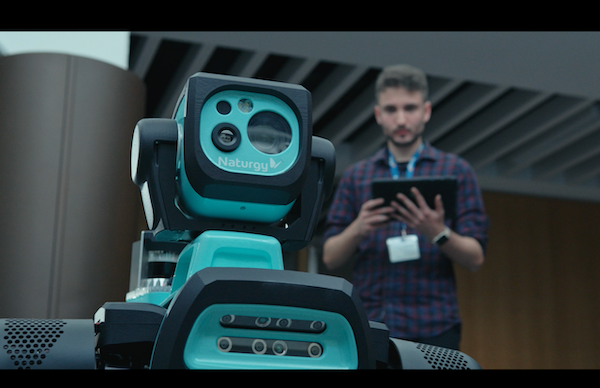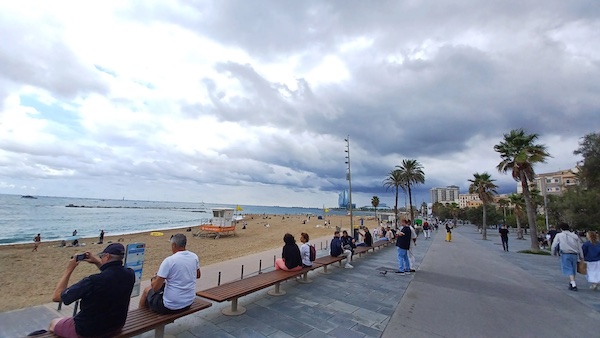Discover the winning projects in the 3rd Esade Alumni BBA Best Thesis Awards, for programmes that ended in July 2021
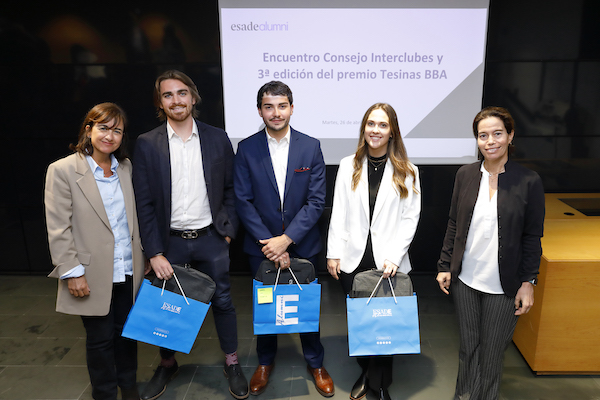
We are thrilled to present the winning projects in the 3rd Esade Alumni BBA Thesis Awards, for programmes that ended in July 2021. This initiative was jointly organised by the Esade Alumni Young Commission and the Esade Alumni interest clubs. The purpose of the awards is to showcase the talent of recent graduates and foster networking and knowledge within the alumni community.
Of the 15 finalists – those projects which received a grade of “excellent” – the ultimate winners were Marta Ruiz, Joshua Egelhoff and Ingrid Wendeling, with their projects on the future of fashion rental, public policies for the energy transition and reputation management on social media, respectively, which were selected on the basis of their subject matter, innovation, impact and visibility.
Additionally, Gabriel Martí received an honorary award under the umbrella of the Cáritas programme Entities with Heart and Universities with Heart.
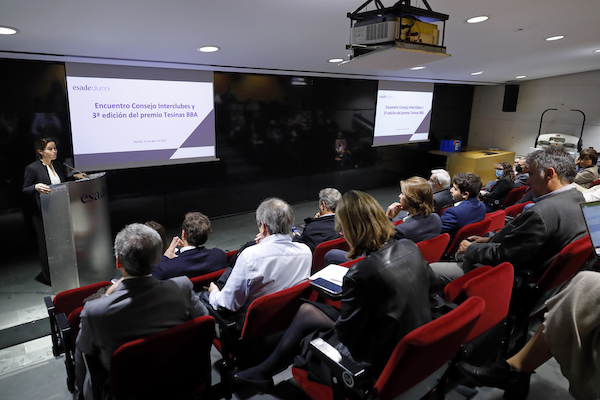
According to Patricia Valentí (MBA ‘02, Promociona ‘17), Director General of Esade Alumni, the BBA Best Thesis Awards are intended to showcase the excellence produced in Esade’s classrooms. Valentí congratulated the winners and invited them to get involved in the alumni network: “Give without expecting anything in return, because there are many needs. Participate in the community, because you will be very welcome.”
Soledad Moya, Senior Lecturer in the Department of Economics, Finance and Accounting at Esade and Academic Director of the Bachelor of Business Administration (BBA), noted that these awards allow the entire community to follow our students more closely and learn about the fantastic projects in which they “apply all the skills they acquire during the programme”.
Marta Ruiz (BBA ‘21), with the thesis Renting in the Fashion Industry
How did the idea for your final project come about and why did you choose this topic?
 My final thesis is entitled Renting in the Fashion Industry. The idea for this project arose from my interest in fashion. I saw this final project as an opportunity to delve deeper into the fashion industry, to gain an in-depth understanding of it and see if I could really find my place in it as a professional. I therefore sought out different sources in search of innovative and disruptive ideas that are currently in vogue in the fashion world. Renting was so disruptive that it struck me as the best idea.
My final thesis is entitled Renting in the Fashion Industry. The idea for this project arose from my interest in fashion. I saw this final project as an opportunity to delve deeper into the fashion industry, to gain an in-depth understanding of it and see if I could really find my place in it as a professional. I therefore sought out different sources in search of innovative and disruptive ideas that are currently in vogue in the fashion world. Renting was so disruptive that it struck me as the best idea.
What conclusions can you share with other alumni?
The aim of my project was to analyse the viability of fashion rental in Spain over a five-year time horizon. Fashion rental is a new way of consuming fashion. Garments are made available to the consumer without the need to purchase them; instead, the consumer rents the garments for a particular period of time. It is a business model based on two booming trends: the collaborative economy and the circular economy. It’s also a model that is already succeeding in countries such as the United States, thanks to its clear value proposition: preventing compulsive consumption and extending the useful life of garments.
It is a social solution. For the consumer, it saves time, space and money. It also provides access to a wider variety of clothes. For businesses, it is a new source of revenue and an expansion of the customer base. And for the environment, it is a sustainable solution to the high levels of pollution caused by fashion, since less stock is required in order to satisfy all demand.
Having completed this project, I can confidently say that fashion rental is a very profitable trend. It is booming and has a promising future in the Spanish market. We have already seen the cultural change that rental requires: much more environmentally conscious consumers who are seeking out new consumption models that allow them to pay only for what they use. Therefore, it’s just a matter of waiting for this trend to arrive in Spain.
"Having completed this project, I can confidently say that fashion rental is a very profitable trend. It is booming and has a promising future in the Spanish market"
What challenges did you encounter in terms of introducing this concept in Spain?
One of the biggest challenges I encountered in the course of my research was the fact that this is an incipient concept, so there are no major examples or studies examining it. This is also true with regard to the implementation of the fashion rental model in the Spanish market. Since there are no references and it is a new concept that people don’t know about, the risk is greater. As things currently stand, you have to invest a lot of resources in getting the word out, because in addition to introducing yourself, you also have to introduce the concept of fashion rental. This means working with high costs and low prices, since, as I have seen in my research, consumers are not open to paying high prices to rent garments. This is an important challenge to take into account.
What did you learn from this project?
This project has allowed me to acquire in-depth knowledge of the fashion sector, while also improving my market analysis skills.
How do you feel about the fact that Esade Alumni has given you an award for your research? What does the alumni network mean to you?
I am very happy and proud that Esade Alumni has given me an award for my research – not just because it reflects well on my work, but also because of the visibility it provides to the winning students. Winning the BBA Best Thesis Award is a very powerful achievement that we can highlight on our CV. I’m sure it will open up job opportunities. It is also a way to keep students engaged with the alumni network. For me, the alumni network presents a wide range of opportunities to keep growing personally and professionally. The best thing is that you can do it in the industry you are most interested in.
Joshua Egelhoff (BBA ‘21) with the thesis Becoming Renewable Ready: A Comparative Study of Public Mechanisms Enabling the Energy Transitio
How did the idea for your final project come about and why did you choose this topic?

Sustainability and climate change are topics we hear about every day. While the research demonstrating the urgency of addressing this problem is extensive, I am often surprised to see that such reports tend not to include proposals on how we should solve this challenge. The current situation facing our global societies demands a practical approach aimed at identifying ways to enable and accelerate change on the ground. This is why I wanted to focus my thesis on identifying mechanisms that are available to us today with a view to implementing tangible improvements that favour sustainability outcomes. Energy systems still account for approximately one fifth of global CO2 emissions, despite the fact that more than a billion people still lack access to these systems, so I thought this was a good place to start.
What conclusions can you share with other alumni?
Improving the sustainability of energy systems requires a two-way approach. Investment and research dedicated to the development and deployment of renewable energy infrastructure loses much of its impact if we do not address the underlying incentives that have been supporting fossil fuels for decades. The central issue is that the price of energy sources does not reflect their social impact. The so-called negative externalities of fossil fuels are massive and are currently being subsidised to the tune of around $5.9 trillion. This means that, if nations are serious about transitioning their energy systems to sustainable sources, incentives for renewables are not enough; we need to actively disincentivise carbon-intensive energy sources in order to level the playing field. Carbon taxes are the simplest way to do this, but in order for this to be truly effective, governments must ensure the availability of effective and affordable alternative energy sources, which is not always the case.
Moreover, some clear conclusions emerged from my study with regard to incentivising the implementation of renewables. The three countries analysed as case studies for this thesis adopted very different strategies, but all made remarkable progress. This makes it clear that there is no one-size-fits-all solution to the energy transition; instead, each country’s approach should be tailored to the national context and objectives. One of the most interesting strategies was that of Morocco, which set up a renewable energy ecosystem involving investment, research and renewable energy planning. During my research, I had the pleasure of speaking with an Esade alumnus working within this ecosystem at Masen, which is responsible for managing renewable energy projects in Morocco. He explained that concentrating renewable energy implementation activities within a single organisation has accelerated learning processes and helped Morocco create successful strategies to develop renewable energy capacity at scale, making the country home to the world’s largest solar farm.
"There is no one-size-fits-all solution to the energy transition; instead, each country’s approach should be tailored to the national context and objectives"
What methodology did you follow?
The study was mainly based on a comparative analysis of three different national renewable energy strategies used by Morocco, Sweden and China. These countries were selected in order to have a diverse representation of effective combinations of mechanisms to accelerate the energy transition, while also capturing some unique examples. Each was assessed against frameworks created by the World Economic Forum and the World Bank, which helped identify the strengths and impact generated by each strategy, as well as the challenges each country faces in sustaining further improvements in the future. In this way, I was able to draw some conclusions about the effectiveness of various mechanisms and how they relate to the broader context within each nation.
How do you feel about the fact that Esade Alumni has given you an award for your research? What does the alumni network mean to you?
Seeing the quality of the work done by my classmates, who have also received awards for their theses, it is absolutely a pleasure to be recognised alongside them for the effort I put into this study. But I also see the selection of the winners and their respective subjects through the lens of Esade Alumni’s commitment to socially relevant issues. Being able to maintain contact with my former classmates, meet new alumni and learn from their experiences as we all follow our different career paths is an invaluable resource, so I am happy to have the chance to keep participating with the alumni community in events like the thesis award ceremony.
What are your professional goals?
My work on this thesis, coupled with my current professional experience in the field of sustainability consulting, has shown me the rewards and satisfaction of working on projects that I am passionate about. I really enjoy the combination of technical knowledge, commercial strategy and collaborative solutions that sustainability challenges require. I see it as one of the most dynamic and impactful areas to work in today. If all goes well, I will continue along these lines and do my best to help find new solutions to build a better and more resilient society.
Ingrid Wendeling (BBA ‘21) with the thesis Effective Reputation Management in the Context of Social Media Crisis: Luxury Apparel Industry 2021
How did the idea for your final project come about and why did you choose the topic of reputation management on social media?

I have always been passionate about the luxury fashion industry. In recent years, there have been many reputational crises involving competing brands in the industry that have been intensified via social media. Given my interest in the field and the importance of the subject, I decided to do an in-depth analysis, from which I could benefit greatly by gaining valuable management insights to kick-start my career. I currently work at La Prairie, a luxury skincare company. I am in the Marketing and Public Relations Department, and I can say for sure that the knowledge and industry trends I uncovered while researching my thesis have added great value to my everyday work.
What did you learn from this project?
The hard work paid off, since I am now working in a field where I can put the ideas from my thesis into practice and further investigate the topic through branding campaigns.
"I can say for sure that the knowledge and industry trends I uncovered while researching my thesis have added great value to my everyday work"
What does it mean to you to receive this award from Esade Alumni? What can young people contribute to the alumni association?
It is an immense pleasure to receive this award, not only for the symbolism behind it, but also as recognition for a project that I worked so hard and so passionately on.
What advice would you give to students who are now finishing their studies?
I would suggest that they choose a subject that they are really passionate about and that they would like to delve deeper into. I would also urge them to apply the knowledge they gain from the project in their future work. That will make the whole process more enjoyable and you will see the added value once you can apply what you have learned at your company.
Gabriel Marí (BBA ‘21) with the thesis Do We Have an Adequate Educational Model for the Future?
How did the idea for your final project come about and why did you choose the topic of education and the future?
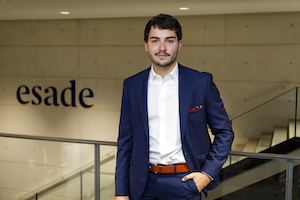
I am very interested in macroeconomics and sociology – more so than in the workings of business. The aim of our economic system should be to improve society’s quality of life and cultural and technological progress. However, the idea for the project came about because I remembered all my friends who were unable to study for external reasons, despite having plenty of skills. This has always made me appreciate how lucky I am. At the same time, it makes me think about what would have happened to me if I had been born into a family with very different circumstances. That’s why I wanted to analyse the influence that education has on our society and economy.
What did you learn from this project?
I gained a better understanding of the current Spanish society, and of all the problems we only hear about in the news from time to time, without really comprehending how deep they go. I can now understand, on a larger scale, the situation in which certain sectors of society find themselves, as well as the causes that have led to this situation.
On a more personal level, on completing my thesis, before I even presented it, I remember being quite satisfied with the work I had done, regardless of how it might be graded a posteriori. I had dedicated many hours to the task, so I felt proud to see how my effort had materialised in a study that I was pleased with.
Also, choosing a subject I was interested in opened up more possibilities for my future. I now know that research is an area that I am curious about. I am not opposed to exploring this path later in my career, if given the chance.
How do you feel about the fact that Cáritas has given you an award for your research?
I’m very grateful for this recognition by an organisation that fights so hard for equal opportunities and to create a more equitable society. I believe that Esade’s collaborations with social organisations are essential to raise awareness about the need for more change. I hope that these collaborations with Cáritas will continue in the future and be extended to more organisations.
I would also encourage students who are interested in this area to do more studies and really consider going into this line of work in the future. In my case, receiving an award for this project motivates me to do other work of a similar nature in the future, but exploring other topics. I believe that there are still many aspects of our society to be analysed. It also seems to me that some of the points I dealt with are worthy of entire projects of their own.
"I now know that research is an area that I am curious about. I am not opposed to exploring this path later in my career, if given the chance"
What advice would you give to students who are now finishing their studies?
I think students find themselves in a wide variety of situations once they have completed their studies. Some are completely clear about what they want to do, or at least the things they want to try; others have a vague idea but don’t know how to get there; still others feel completely lost.
Whatever the situation, it never hurts to do a bit of introspection, because sooner or later in life you will have to do so. It is better to do it now when you are young and have your life ahead of you than later, when you discover that you chose the wrong path because you did not ask yourself what you really wanted to do.
So I would recommend reflecting on what kind of person you would like to become, beyond what friends and family expect of you or what you are supposed to become in order to be “successful”. I’m not just talking about how you will see yourself in 10 years. I’m talking about what type of person you want to be, in terms of personality and behaviour.
Finally, to those who have not yet found their path, don’t worry. Although it is important to have goals, they can change throughout your life depending on what you think you want. In the end, there is a major component of improvisation and adaptability, whether you like it or not. That’s where you end up finding your purpose by trying new things.



 My final thesis is entitled Renting in the Fashion Industry. The idea for this project arose from my interest in fashion. I saw this final project as an opportunity to delve deeper into the fashion industry, to gain an in-depth understanding of it and see if I could really find my place in it as a professional. I therefore sought out different sources in search of innovative and disruptive ideas that are currently in vogue in the fashion world. Renting was so disruptive that it struck me as the best idea.
My final thesis is entitled Renting in the Fashion Industry. The idea for this project arose from my interest in fashion. I saw this final project as an opportunity to delve deeper into the fashion industry, to gain an in-depth understanding of it and see if I could really find my place in it as a professional. I therefore sought out different sources in search of innovative and disruptive ideas that are currently in vogue in the fashion world. Renting was so disruptive that it struck me as the best idea.



